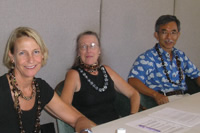News & Announcements
- Details
- Written by Bruce Schenk
Paper by Bruce Schenk, presented in a plenary session at "Improving Citizenship & Restoring Community," the IIRP''s 10th International Institute for Restorative Practices World Conference, November 7-9, 2007, Budapest, Hungary.
- Details
- Written by Gyöngyvér Magyar
Paper by Gyöngyvér Magyar, presented in a plenary session at "Improving Citizenship & Restoring Community," the IIRP''s 10th International Institute for Restorative Practices World Conference, November 7-9, 2007, Budapest, Hungary.
- Details
- Written by Mária Kerényi
Paper by Mária Kerényi, presented in a plenary session at "Improving Citizenship & Restoring Community," the IIRP's 10th International Institute for Restorative Practices World Conference, November 7-9, 2007, Budapest, Hungary.
- Details
- Written by Erszébet Hatvani
Paper by Erzsébet Hatvani, presented in a plenary session at "Improving Citizenship & Restoring Community," the IIRP''s 10th International Institute for Restorative Practices World Conference, November 7-9, 2007, Budapest, Hungary.
- Details
- Written by Eva Fahlström Borg
Paper by Eva Fahlström Borg, presented in a plenary session at "Improving Citizenship & Restoring Community," the IIRP''s 10th International Institute for Restorative Practices World Conference, November 7-9, 2007, Budapest, Hungary.
- Details
- Written by Les Davey
Paper by Les Davey, presented in a plenary session at "Improving Citizenship & Restoring Community," the IIRP''s 10th International Institute for Restorative Practices World Conference, November 7-9, 2007, Budapest, Hungary.
- Details
- Written by Joshua Wachtel
“The pace is accelerating,” said van Pagée. “When we started in 2001 we trained 14 independent coordinators and two teams of facilitators but had no conferences. It took five months to get the first conference. Everybody said, ‘This is a great idea... but not for my clients.’”
Van Pagée started his career as a social worker dealing with child abuse cases, so he understands the system. “I had to go to the mother and kids and the father (who might be drunk or absent), speak to the school and the home physician (never neighbors, because of privacy issues). I returned to my supervisor and said, ‘This is what’s happening. I think we should do this and that.’ This is how decisions are made. Then you go back to the family and say, ‘This is the plan.’”
- Details
- Written by Ted Wachtel
After a preamble acknowledging those in attendance and acceptance of his new responsibilities as president, Wachtel began his speech.
Thirty years ago my wife Susan and I, both public school teachers, were looking for solutions to the increasingly challenging behavior of young people in schools, families and communities. We left public education, founded the first of several non-profit organizations and developed schools, group homes and other programs for delinquent and at-risk youth. As time went on we realized that the successful strategies we were using with the troubled young people in our programs had implications for all young people, and for adults as well.
We and our colleagues also got involved with an innovative approach in the field of criminal justice, called “restorative justice,” which provides opportunities for victims, offenders, and their family and friends, to meet and, to the extent possible, repair the harm caused by a crime. This development in criminal justice, giving people an opportunity to express their feelings and ideas and have a say in resolving the conflict, matched parallel developments in other fields.
- Details
- Written by Lynn M. Welden
Alyssa (not her real name), 18, made some unfortunate choices over the last few years, some with legal consequences. But her situation improved recently, thanks to a Family Group Decision Making (FGDM) conference facilitated by the Community Service Foundation (CSF) in Pennsylvania, USA, one of the IIRP’s demonstration programs. By involving Alyssa’s family and friends and tapping into their collective feelings of responsibility and concern, FGDM encouraged her to commit to positive changes in her life.
On probation and unable to function in school, Alyssa was in and out of alternative programs, youth detention facilities and group homes.
- Details
- Written by Abbey J. Porter
 Lorenn Walker, Kat Brady and Ted Sakai speak about An unusual program developed in Hawaii is helping inmates learn new skills, reconnect with their loved ones and prepare for life outside the prison walls.
Lorenn Walker, Kat Brady and Ted Sakai speak about An unusual program developed in Hawaii is helping inmates learn new skills, reconnect with their loved ones and prepare for life outside the prison walls.The Restorative Circle Project, which began at Waiawa Correctional Facility on the island of O’ahu, brings inmates together with the people they have wronged to find ways to repair the harm, explore forgiveness and make plans for their transition back into the community.
The project is one of two restorative justice prison initiatives launched by Lorenn Walker of Hawaii Friends of Civic and Law Related Education. In addition to the Restorative Circle project, Walker also offers the inmates restorative justice facilitator training, a 12-week program that teaches communication and conflict resolution skills.
“I’m on a mission to help transform the justice system and make it healthy and healing,” said Walker, a public health educator and former trial lawyer who has worked in many aspects of the legal system, from family court to representing the Hawaii state prison system as deputy attorney general.

Restorative Works Year in Review 2024 (PDF)
All our donors are acknowledged annually in Restorative Works.
